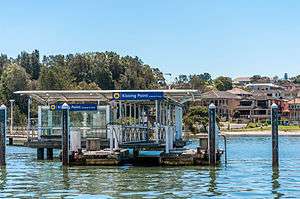Kissing Point, New South Wales

Kissing Point is a point on the Parramatta River about 2 km south of Ryde,[1] located in the suburb of Putney. Historically, the name referred to a much wider area than the current-day point; and perhaps originally to the point near Ryde Bridge where Settlers Park is now located, and where a 1948 brass plaque by the Council states "THIS IS THE SITE OF THE FIRST SETTLEMENT ON 10th JANUARY 1792 - BY - WILLIAM CARELESS and JAMES WEAVERS IN THE LOCALITY SET UP BY GOVERNOR PHILLIP AS FARMS OF THE EASTERN BOUNDARY (LATER CALLED KISSING POINT)".
History
Origin of the name
Several possibilities have been suggested for the origin of the name "Kissing Point". One is that the name was given because the area of water around it was the furthest up Parramatta River that heavily laden vessels could reach before their keels "kissed" the bottom. Another, more romantic possibility is the area was popular for picnics and that Governor Hunter may have had a kiss in return for his chivalry on one such occasion.[2] A third is that Governor Hunter rowed up the river on a journey of exploration, had breakfast at Breakfast Point, rowed across the river to Kissing Point where he kissed his wife goodbye before embarking on his journey.[3]
Settlement
The area was inhabited by the Wallumedegal people prior to European Settlement.
When the area was first settled by European colonists it was known as Eastern Farms. Land grants were made to 10 emancipated convicts in 1792. By 1794 the name had given way to Kissing Point.[4] In the early 19th century the name was applied to an area including the current day Ryde, Putney and Gladesville.
One of the emancipists was James Squire who brewed the colony's first beer and became a wealthy business man. He grew hops in the area and established a brewery and a tavern on the location just west of the current-day Kissing Point. A plaque to James Squire is erected on the site.[5]
Kissing Point was also an important source of fruits and vegetables for the early colony.
Bennelong died in the area.[6] He was buried on the property of James Squire, probably in the area of the current day Cleves Park, around 300 metres from the point.
Kidman and Mayoh’s Shipyard established to build freight ships to replace freight fleet post World War I. A disastrous outcome, as the two ships built here were not commissioned, and were burnt and sold for salvage. Halvorsen’s ships located where James Squire’s original wharf stood. Halvorsen’s made ships for World War II.[7]
Current day
Kissing Point is in the Parish of Hunters Hill in the County of Cumberland.[1] and is in the suburb of Putney.
Kissing Point is home to two wharfs; one at Bennelong Park and the other constructed off the very tip of the peninsula, the Sydney Ferries Kissing Point Wharf. Sydney Ferries operates a regular service to the Sydney CBD from the Kissing Point Wharf. Sydney Buses service 507 operates to the point.
There is a boat launching ramp adjacent to the Kissing Point Wharf with associated trailer parking. The point is a landmark on the Parramatta Valley Cycleway.
References
- 1 2 "Kissing Point". Geographical Names Register (GNR) of NSW. Geographical Names Board of New South Wales. Retrieved 4 August 2013.
- ↑ "Official Newsletter of the Concord Heritage Society" (PDF). August 2003. Archived from the original (pdf) on 19 February 2011. Retrieved 9 September 2010.
- ↑ Sydney Morning Herald (9 December 1935). "RYDE BRIDGE". Retrieved 3 August 2013.
- ↑ "A Brief History of Ryde" Archived 5 July 2007 at the Wayback Machine., City of Ryde
- ↑ Ryde Council. "Ryde Riverwalk Master Plan (Precinct 4)". Archived from the original on 31 August 2010. Retrieved 9 September 2010.
- ↑ "Sydney". The Sydney Gazette and New South Wales Advertiser. 9 January 1813. Retrieved 3 August 2013.
- ↑ Ryde River Walk Masterplan Archived 6 July 2011 at the Wayback Machine. at Ryde City Council
External links
- "Kidman & Mayoh's Shipyard at Kissing Point", City of Ryde
Coordinates: 33°49′50″S 151°06′05″E / 33.830687°S 151.101513°E